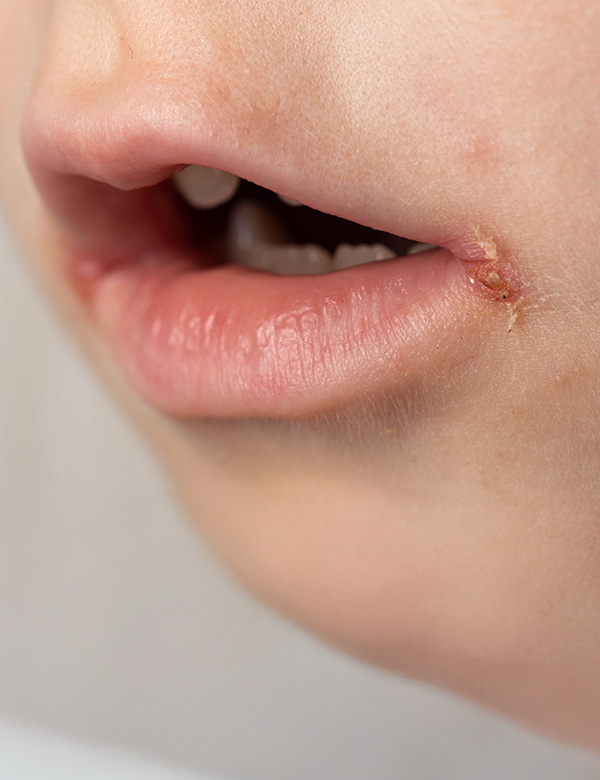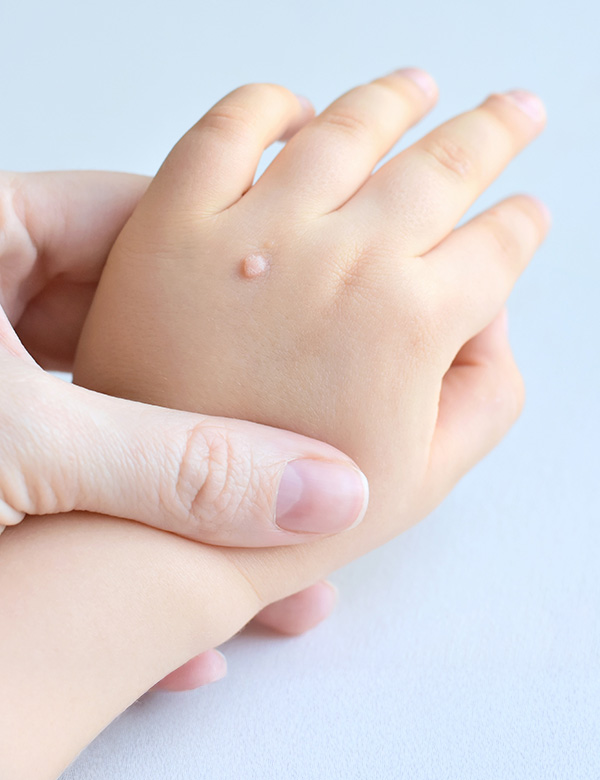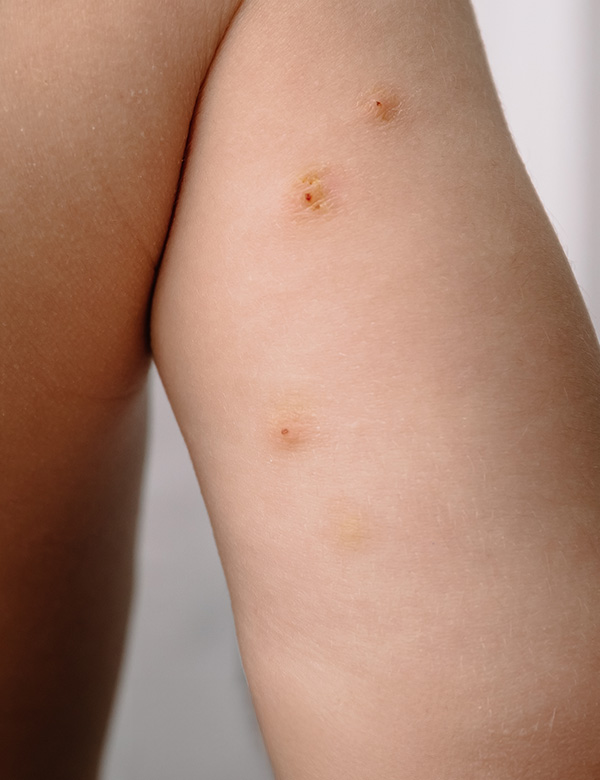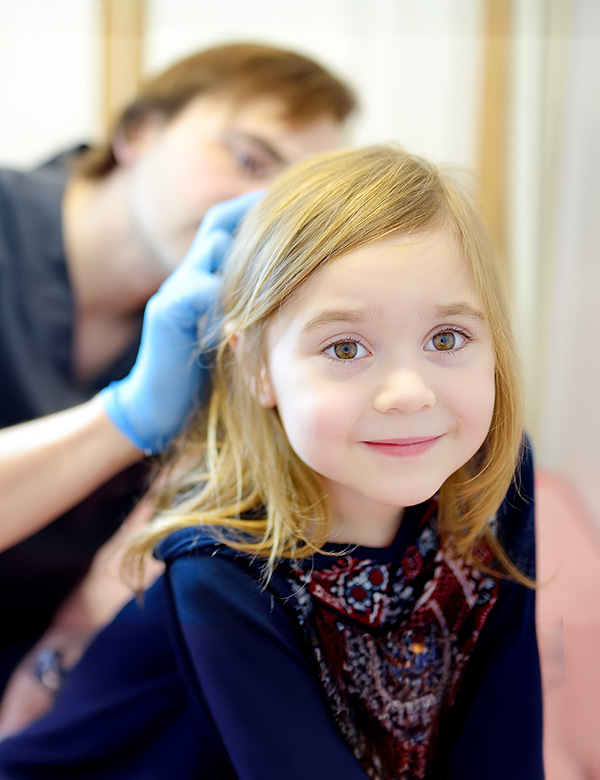Neurodermatitis in Children
Identifying and treating neurodermatitis in children – with an experienced pediatric dermatologist at Derma Medical Clinic in Zurich – Sihlcity
Neurodermatitis in Children
Chronische Abszesse und schmerzhafte Knoten durch erfahrenen Hautarzt abklären und behandeln in der Derma Medical Clinic in Zürich - Sihlcity
Skin eczema in children should be carefully examined and treated – especially when skin irritation like itchy or dry areas keeps coming back or if previous treatments haven’t worked as expected.
Examinations
Thorough skin examination
Assessment of skin appearance
Allergy testing if needed
Procedure
Personal consultation
Detailed skin examination
Creation of a treatment plan
Duration
approx. 20–30 minutes
What Is Neurodermatitis in Children?
Neurodermatitis is a chronic skin condition that commonly affects children.
It causes dry, rough, red patches that itch intensely. These usually appear in the elbow creases, back of the knees, on the face, or neck.
Typical signs include periods when symptoms worsen (flare-ups), followed by calmer phases.
A careful examination is especially important if:
- Recurring eczema with severe itching, redness, or dry skin appears
- Skin irritation doesn’t improve with regular skincare or gets worse
- The symptoms affect the child’s sleep or daily life
- It’s unclear whether it’s really neurodermatitis or something else
- Repeated infections or inflammation of the skin occur

What Is Neurodermatitis in Children?
Neurodermatitis is a chronic skin condition that commonly affects children.
It causes dry, rough, red patches that itch intensely. These usually appear in the elbow creases, back of the knees, on the face, or neck.
Typical signs include periods when symptoms worsen (flare-ups), followed by calmer phases.
When Is It a Good Idea to Have Neurodermatitis in Children Checked?
A careful examination is especially important if:
- Recurring eczema with severe itching, redness, or dry skin appears
- Skin irritation doesn’t improve with regular skincare or gets worse
- The symptoms affect the child’s sleep or daily life
- It’s unclear whether it’s really neurodermatitis or something else
- Repeated infections or inflammation of the skin occur
Treatment
At Derma Medical Clinic, every treatment starts with a thorough skin examination. Our specialized pediatric dermatologist checks whether it’s truly neurodermatitis – an important step since many skin conditions in children look similar.
The skin appearance, spread, and possible infections are carefully assessed. Depending on the case, additional allergy tests can be helpful to better understand possible triggers and support the diagnosis.
What Does the Treatment for Neurodermatitis in Children Involve?
Treatment is always tailored to the child and includes:
- A well-thought-out skincare routine with moisturizing creams and lotions
- Anti-inflammatory treatments such as cortisone-based or other anti-inflammatory creams
- Additional therapies when needed, such as UV treatment or medications
- Advice on triggers and everyday tips (e.g. clothing, laundry detergents, nutrition)
How Does the Treatment Process Work?
Important: The examination is done calmly and at the child’s own pace. We only proceed with exams or treatments when the child feels safe. No one is forced to do anything – instead, our team responds with patience and experience to the child’s mood and behavior.
Personal consultation
We begin by carefully discussing the child’s medical history, past treatments, and current symptoms.
Thorough skin examination
We closely assess the skin: location, extent, typical features, and any signs of infection.
Individual advice and treatment planning
Based on the findings, we create a treatment plan tailored to your child.
Age-appropriate approach
Treatment is adapted to the child’s age. Parents receive clear instructions for daily skincare.
Follow-up visits
Regular checks help ensure the treatment is working well and can be adjusted if needed.

At Derma Medical Clinic in Zurich – Sihlcity, children are treated by Dr. Markus Dendorfer, a board-certified dermatologist and specialized pediatric dermatologist.
He has many years of experience in child-friendly skin diagnostics and therapy and has a special sensitivity for the individual needs of his young patients.

Dr. med. Benjamin Miller
Board-certified Specialist in Dermatology & Venereology FMH

Dr. med. Markus Dendorfer
Board-certified Specialist in Dermatology & Venereology FMH
What You Can Expect from Us
Specialized Pediatric Dermatology
Treatment by an experienced pediatric dermatologist focused on neurodermatitis and other childhood eczema conditions.
Thorough Diagnosis
Careful examination of the skin and – if necessary – additional allergy testing to ensure an accurate diagnosis and discover possible triggers.
Individualized Treatment
A treatment plan combining skincare, anti-inflammatory therapies, and practical everyday advice – always tailored to the child’s age and skin.
Age-Appropriate Approach
With patience, empathy, and a calm process, we make sure that both children and parents feel well cared for.
Everything Under One Roof
All steps – diagnosis, treatment, and follow-up – happen directly at the clinic, with no extra trips or long waiting times.
Do you want clarity about your child’s skin changes and a gentle, age-appropriate treatment guided by patience?
Book an appointment now in our specialized pediatric consultation at Derma Medical Clinic in Zurich – Sihlcity.
FAQ – Common Questions About Neurodermatitis in Children
What is neurodermatitis in children?
Neurodermatitis (medical term: atopic dermatitis) is a chronic inflammatory skin condition. It causes dry, red skin and intense itching, and is especially common in children.
How can you recognize neurodermatitis in children?
Typical signs are dry, flaky, and red skin patches – often in the elbow creases, behind the knees, on the face, or neck. Intense itching nearly always goes along with it.
What causes flare-ups of neurodermatitis in children?
Possible triggers include cold, heat, stress, certain foods, pollen, animal hair, or rough clothing. Each child is different, so individual testing is helpful.
How is neurodermatitis treated in children?
Treatment combines regular skincare with moisturizing creams and – if needed – anti-inflammatory therapies like cortisone-based or other medicated creams. The main goal is to relieve symptoms and prevent flare-ups.
What skincare is important for neurodermatitis?
Frequent moisturizing with special products for neurodermatitis helps strengthen the skin barrier and prevent new flare-ups.
Is neurodermatitis in children curable?
Neurodermatitis can’t be cured, but it can be managed well. In many children, the symptoms improve with age or even disappear completely.
Can diet affect neurodermatitis?
Some children react to certain foods. Allergy tests can help find possible connections. Foods should only be avoided if your doctor recommends it.
What helps with severe itching?
Cool compresses, itch-relieving creams, and good skincare can help. Keeping fingernails short prevents damage from scratching.
When should a dermatologist be consulted?
If flare-ups happen often, the skin is badly inflamed, or the symptoms don’t improve with good care, a dermatologist should assess the next steps.




